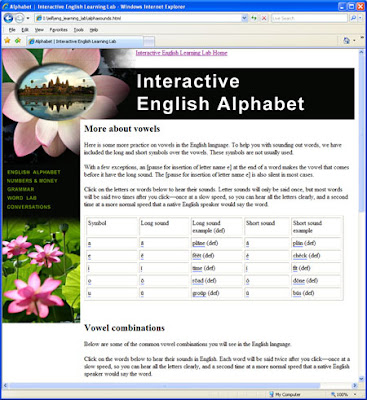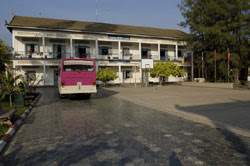
Below is an excerpt from a letter I used to explain our objectives on this mission back to Cambodia. After we were able to satisfy objectives 1 and 2, and tabling item 3 for lack of resources, I turned my efforts to objective #4. Since I am a web programmer by trade, I thought I could try and build what we had wanted to buy. I fashioned the Interactive English Learning Lab project into a self-study course for my
MBA at William & Mary, and I call the course "Integrating Information Technology into the Educational Curriculum of a Developing Economy."
-------------------------------------

A couple classmates and I are going back to the Wat Bo Primary School in Siem Reap, Cambodia this June. Because I am not sure how much background you have about this, let me set the stage.
Wat Bo Primary School is a public school, led by a dedicated principal whose leadership has been complemented by the efforts of Ponheary Ly. Ponheary and the principal are lifelong friends whose relationship began long before the Killing Fields, a bloody period in Cambodia’s recent history when schools were converted to prisons and torture centers, teachers (and the suspected-to-be-educated) were killed without question, and for four years people were forced to work menial jobs for 12 hours a day in exchange for only famine-inducing rations and deplorable living conditions. Since Pol Pot left power in 1979 and the Khmer Rouge's rule ended, the country of Cambodia has been starting over.
We had the honor of helping the Wat Bo Primary School a lot in the hours we were there during our first visit in January with Dr. Don Rahtz's International Business Practicum.

We built and ran network cables, fixed several broken PCs, and set up three new laptops and a wireless file sharing network. There is no doubt we made a huge impact on the students’ and teachers’ lives. There was also a lot left undone, and so much more we could have done with time and resources. Part in an effort to finish what we started, part in a desire to see those little smiling faces and eyes filled with hope, a small group of us has decided to return to the Wat Bo School. We are going to finish what we began: fixing and upgrading the technology at the school, and getting them what they need to change these kids’ lives.
As an IT leader organizing our return trip, I have described some of the biggest information technology (and other) challenges facing our group, and arranged them in order of priority.
1) Get the school a DSL Internet connection. DSL is the predominant high-speed Internet service in Siem Reap. Right now, only the school’s principal has Internet, and his connection is dial-up. The laptops we gave the school, which have wireless capability and connectivity, are currently relegated to just sharing files.
2) Two new computer lab workstations and a pair of video conferencing cams. The computer lab could use some additional resources. Additionally, we would like to establish a technological link between the William and Mary Mason School of Business and the Wat Bo School administration via web cams. One would be located at the Wat Bo School, one at William and Mary.
3) Get the headmaster a new computer and printer. He has unselfishly sacrificed his own computing power for his students’ benefit, as the lab computers are much more powerful and modern than his. As the backbone for the school, his current machine is just not making the grade.
4) Interactive English Learning Lab. English is the ticket out of poverty for many Cambodian children and their families. I would like to establish an English Learning Lab, with self-paced and interactive computer-based lessons. Consider what Sophea, who hopes to get a job as an interpreter, said about learning English: “Now I can hope to have a good job and support my parents.”
5) Miscellaneous supplies. Ethernet hub/cables, a networked laser printer for the student lab and faculty laptops, a digital camera for the headmaster, photo processing software, learning/critical thinking games for young children, 220v power strips, headphones for the computers, web cam, English software and reference materials, a more secure door and lock to keep all the equipment physically safe, etc.
6) Donation to the Ponheary Ly Foundation (PLF). The PLF is always interested in building its nest egg so fund great programs like after school English tutoring sessions, breakfast programs, school uniform subsidies, and bicycle scholarships to top-performing primary school graduates so they can continue their studies (which usually requires a daily trek of 9-miles or more). A $5,000 investment in the foundation earns about enough interest per month to:
i. Buy one bicycle for a scholarship recipient, or
ii. Pay teachers to do 60 after school English lessons , or
iii. Provide 600 breakfasts for students.





